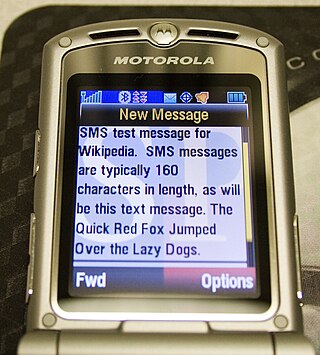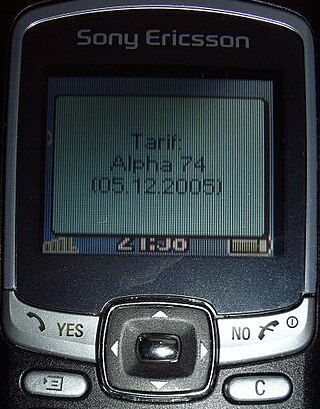Related Research Articles

Short Message Service, commonly abbreviated as SMS, is a text messaging service component of most telephone, Internet and mobile device systems. It uses standardized communication protocols that let mobile phones exchange short text messages. Additionally, an intermediary service can facilitate a text-to-voice conversion to be sent to landlines.

A SIMcard is an integrated circuit (IC) intended to securely store an international mobile subscriber identity (IMSI) number and its related key, which are used to identify and authenticate subscribers on mobile telephone devices. Technically the actual physical card is known as a universal integrated circuit card (UICC); this smart card is usually made of PVC with embedded contacts and semiconductors, with the SIM as its primary component. In practice the term "SIM card" is still used to refer to the entire unit and not simply the IC.
A SIM lock, simlock, network lock, carrier lock or (master) subsidy lock is a technical restriction built into GSM and CDMA mobile phones by mobile phone manufacturers for use by service providers to restrict the use of these phones to specific countries and/or networks. This is in contrast to a phone that does not impose any SIM restrictions.

Mobile payment, also referred to as mobile money, mobile money transfer and mobile wallet, is any of various payment processing services operated under financial regulations and performed from or via a mobile device. Instead of paying with cash, cheque, or credit card, a consumer can use a payment app on a mobile device to pay for a wide range of services and digital or hard goods. Although the concept of using non-coin-based currency systems has a long history, it is only in the 21st century that the technology to support such systems has become widely available.

Unstructured Supplementary Service Data (USSD), sometimes referred to as "quick codes" or "feature codes", is a communications protocol used by GSM cellular telephones to communicate with the mobile network operator's computers. USSD can be used for WAP browsing, prepaid callback service, mobile-money services, location-based content services, menu-based information services, and as part of configuring the phone on the network. The service does not require a messaging app, and does not incur charges.

A prepaid mobile device, also known as a pay-as-you-go (PAYG), pay-as-you-talk, pay and go, go-phone, prepay, or burner phone, is a mobile device such as a phone for which credit is purchased in advance of service use. The purchased credit is used to pay for telecommunications services at the point the service is accessed or consumed. If there is no credit, then access is denied by the cellular network or Intelligent Network. Users can top up their credit at any time using a variety of payment mechanisms.
TracFone Wireless, Inc. (TFWI) is an American prepaid, no-contract mobile phone provider. TFWI is a subsidiary of Verizon Communications, and offers products and services under several brands. It operates as a mobile virtual network operator (MVNO), holding agreements with the three largest United States wireless network operators to provide service: AT&T Mobility, T-Mobile US, and Verizon.

Q-Telecom was the fourth mobile telephony provider in Greece. It began operation in June 2002. As of 2008, it called itself "Q" and called its services "MyQ." The company provided GSM phone service, supported by LMDS and backbone networks, and called itself the only complete and integrated telecom provider in Greece. In May 2007, it merged with WIND Hellas, which was known at the time as TIM Hellas.

Gemalto was an international digital security company providing software applications, secure personal devices such as smart cards and tokens, e-wallets and managed services. It was formed in June 2006 by the merger of two companies, Axalto and Gemplus International. Gemalto N.V.'s revenue in 2018 was €2.969 billion.
An SMS gateway or MMS gateway allows a computer to send or receive text messages in the form of Short Message Service (SMS) or Multimedia Messaging Service (MMS) transmissions between local and/or international telecommunications networks. In most cases, SMS and MMS are eventually routed to a mobile phone through a wireless carrier. SMS gateways are commonly used as a method for person-to-person to device-to-person communications. Many SMS gateways support content and media conversions from email, push, voice, and other formats.
A mobile signature is a digital signature generated either on a mobile phone or on a SIM card on a mobile phone.
SIM Application Toolkit (STK) is a standard of the GSM system which enables the subscriber identity module to initiate actions which can be used for various value-added services. Similar standards exist for other network and card systems, with the USIM Application Toolkit (USAT) for USIMs used by newer-generation networks being an example. A more general name for this class of Java Card-based applications running on UICC cards is the Card Application Toolkit (CAT).
Mobile identity is a development of online authentication and digital signatures, where the SIM card of one's mobile phone works as an identity tool. Mobile identity enables legally binding authentication and transaction signing for online banking, payment confirmation, corporate services, and consuming online content. The user's certificates are maintained on the telecom operator's SIM card and in order to use them, the user has to enter a personal, secret PIN code. When using mobile identity, no separate card reader is needed, as the phone itself already performs both functions.
Chikka, short for Chikka Text Messenger, was an Internet-based instant messaging application that supported free SMS or text messaging between online users and offline mobile subscribers. Chikka was released by Chikka Philippines, Inc. in 2000 and eventually established its connection with the country's network operators Smart Communications (2001), Globe Telecom (2002) and Sun Cellular (2004). With up to billions of messages being exchanged between online and mobile communities worldwide through Chikka, it is probably the world's first commercially successful integration of web and mobile utilities.

Transatel is a telecom corporation headquartered in Paris, La Défense, and led by the founders Jacques Bonifay (CEO) and Bertrand Salomon. NTT Communications took a majority stake in the company on 28 February 2019, transferred to NTT Ltd. on 1 July 2019.

Rich Communication Services (RCS) is a communication protocol standard between mobile telephone carriers, based on IP Multimedia Subsystem, developed and defined by the GSM Association (GSMA). It aims to be a replacement of SMS and MMS, with a text-message system that is richer and provides phonebook polling. It is also marketed as Advanced Messaging, and was previously marketed as chat features, joyn, SMSoIP, Message+, and SMS+.

Buzzinbees is a privately owned company that develops software and sells it to telecommunication equipment and software vendors. It is based in Seyssinet-Pariset near Grenoble in France. It was founded in 2009 by its current CEO Jean-René Bouvier. Buzzinbees's products are currently active in more than 135 countries worldwide. In December 2015, Gemalto acquired Buzzinbees for an undisclosed amount. Olivier Piou stated that the acquisition was motivated by Buzzinbees activation solution, especially for machine to machine.
Facebook Zero is an initiative undertaken by social networking service company Facebook in collaboration with mobile phone-based Internet providers, whereby the providers waive data (bandwidth) charges for accessing Facebook on phones via a stripped-down text-only version of its mobile website. The stripped-down version is available online only through providers who have entered the agreement with Facebook. Photos are not loaded by default. Users may still choose to view them by clicking through but regular data charges apply to photo use.
A SIM swap scam is a type of account takeover fraud that generally targets a weakness in two-factor authentication and two-step verification in which the second factor or step is a text message (SMS) or call placed to a mobile telephone.
References
- 1 2 "Facebook for SIM: Bringing Facebook to any mobile". Gemalto. Archived from the original on January 28, 2014. Retrieved January 22, 2014.
- 1 2 Tofel, Kevin (October 6, 2011). "Facebook for SIM uses SMS; no data plan required". GigaOm. Archived from the original on February 1, 2014. Retrieved January 22, 2014.
- 1 2 Cohen, Jackie (February 14, 2011). "First Facebook SIM Card Released". AllFacebook. Retrieved January 22, 2014.
- ↑ Protalinski, Emil (February 14, 2011). "Gemalto creates SIM card that brings Facebook to feature phones". ZDNet . Archived from the original on February 18, 2011. Retrieved January 22, 2014.
- ↑ Chansanchal, Athima (February 15, 2011). "Facebook takes over the world, one SIM card at a time". NBC News. Retrieved January 22, 2014.
- ↑ Cohen, David (September 12, 2013). "Facebook Messenger Added To Gemalto Facebook For SIM For Feature Phones". AllFacebook. Retrieved January 22, 2014.
- ↑ "Gemalto's LinqUs Facebook for SIM now supports Facebook Messenger". InformationWeek . September 18, 2013. Archived from the original on February 1, 2014. Retrieved January 22, 2014.
- ↑ "Obsolete Products". Gemalto. Archived from the original on April 22, 2017. Retrieved March 26, 2017.